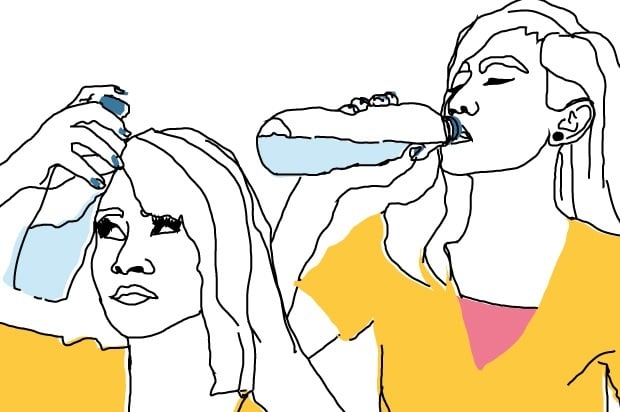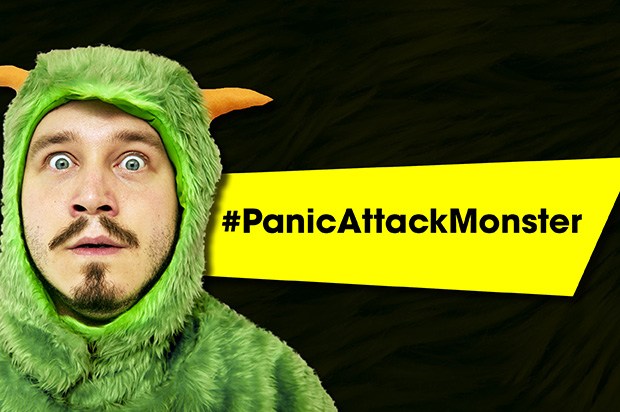Help, I’m having a panic attack
As part of Mental Health Awareness Week, writer and mental health campaigner Natasha Devon guest edited some of our favourite content. Find out more about dealing with panic attacks, featuring Natasha's expert commentary.

Natasha Devon says:
I’ve had panic attacks pretty much my entire life. The good news is, through a combination of therapy and my own learning I’ve got to a stage where, nine times out of ten, I can head them off. For me, it’s all about recognising the early warning signs. Panic attacks might feel like they pop up out of nowhere, but the truth is they’ve usually been building up over a period of hours, sometimes days.
With me, anxiety often manifests itself as irritability. If everyone’s getting on my nerves for no good reason, I take it as a sign I need to do something, like exercise or relaxation, to manage my stress. If I’m entering panic mode, colours become brighter, sounds much louder and my vision will ‘zoom in’ on a particular spot. If I register that this is happening, I use some of the breathing techniques below.
A quick note here – ALWAYS breathe out first. Panic makes you take in too much oxygen, so taking a deep breath in first will make you feel light headed.
You are not dying
You’re overdosing on adrenaline released by your body because you’re feeling scared. This means your chest is tight, you feel like you can’t breathe, your heart beats like crazy, and you feel like you’re going to faint.
You might also be feeling terrified and deeply alone and miserable.
While you might feel like you’re dying – a common experience – we promise none of this is fatal.
It will pass, usually within between ten minutes and half an hour.
Breathe in and out. Slowly.
Close your mouth and breathe using your nose.
Take a normal sized breath, for three seconds. Count along the seconds in your head.
Now breathe out – still through your nose – for another three seconds.
Picture something calming and beautiful – maybe waves lapping gently across an empty beach?
Keep breathing in using your nose.
In for three…out for three…in for three…out for three.
Do this for at least two minutes.
What just happened to me?
When we have scary thoughts, or are in scary situation (like being in a crowded place) our bodies are tricked into thinking we’re in danger. This is a biological hangover from our caveman times, when scary thoughts usually meant ‘THERE’S A MAMMOTH OUTSIDE ABOUT TO EAT ME’ and you needed adrenaline to be able to fight it off/run away quickly.
But if there isn’t a woolly mammoth outside, then there’s nowhere for this adrenaline to go. Your body can’t distinguish between mammoths and work stress/feeling squashed in a crowd. So this adrenaline causes all these horrible feelings of panic. When you then panic about these feelings, and thus release MORE adrenaline, you’ll likely trigger a panic attack.
How do other people cope with panic attacks?
Panic attacks are much more common than you think. Lots of young people suffer from them. We asked some of The Mix’s users how they cope when panic strikes:
Modo says: “Have a special word or image you can bring to mind when you’re having a panic attack. Oddly, my word is ‘But’. I remember reading The Phantom Tollbooth and Milo uses the word ‘but’ in a canon and it’s powerful enough to destroy the bad things that are happening.
Remember that you’re not actually dying. Your body is responding completely naturally to the influx of adrenaline. You’re not being silly and they’re nothing to be ashamed of. Breathing is crucial too.”
Idris says: “Sometimes I’ll try just to get out of the situation that’s causing the panic attack. Like if I’m on a crowded tube or something, I’ll get off so I can access better quality air.
I had CBT and I was taught to visualise myself in a bubble that can flex but not break. It sounds weird but it can really help to feel like no one can touch you.”
It hasn’t gone away!
Go to the doctor if:
You’ve followed these breathing exercises for over 20 minutes and nothing has changed.
Your breathing still hasn’t gone back to normal, and your chest stills hurts and feels tight.
You start having this experience regularly.
Next Steps
- Mind offers advice and support to people with mental health problems. Their helpline runs nine to six from Monday to Friday. 0300 123 3393
- Chat about this subject on our Discussion Boards.
By
Updated on 22-Dec-2015
No featured article










